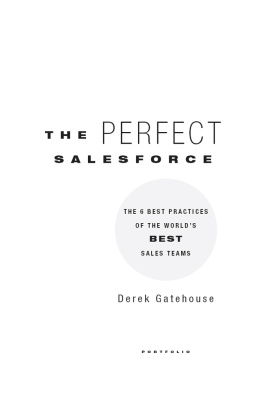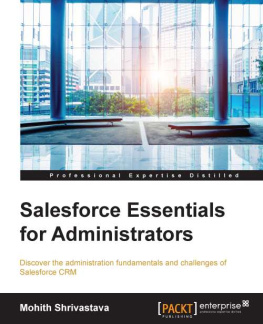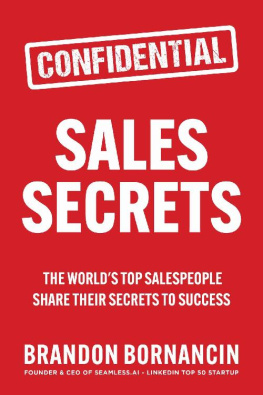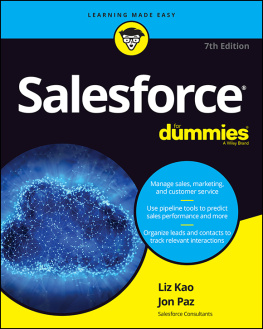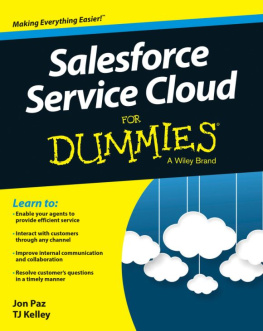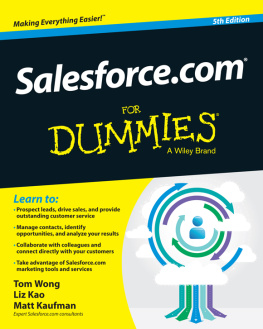Gatehouse - The Perfect SalesForce: The 6 Best Practices of The Worlds Best Sales Teams
Here you can read online Gatehouse - The Perfect SalesForce: The 6 Best Practices of The Worlds Best Sales Teams full text of the book (entire story) in english for free. Download pdf and epub, get meaning, cover and reviews about this ebook. year: 2007, publisher: Portfolio, genre: Religion. Description of the work, (preface) as well as reviews are available. Best literature library LitArk.com created for fans of good reading and offers a wide selection of genres:
Romance novel
Science fiction
Adventure
Detective
Science
History
Home and family
Prose
Art
Politics
Computer
Non-fiction
Religion
Business
Children
Humor
Choose a favorite category and find really read worthwhile books. Enjoy immersion in the world of imagination, feel the emotions of the characters or learn something new for yourself, make an fascinating discovery.
The Perfect SalesForce: The 6 Best Practices of The Worlds Best Sales Teams: summary, description and annotation
We offer to read an annotation, description, summary or preface (depends on what the author of the book "The Perfect SalesForce: The 6 Best Practices of The Worlds Best Sales Teams" wrote himself). If you haven't found the necessary information about the book — write in the comments, we will try to find it.
Gatehouse: author's other books
Who wrote The Perfect SalesForce: The 6 Best Practices of The Worlds Best Sales Teams? Find out the surname, the name of the author of the book and a list of all author's works by series.
The Perfect SalesForce: The 6 Best Practices of The Worlds Best Sales Teams — read online for free the complete book (whole text) full work
Below is the text of the book, divided by pages. System saving the place of the last page read, allows you to conveniently read the book "The Perfect SalesForce: The 6 Best Practices of The Worlds Best Sales Teams" online for free, without having to search again every time where you left off. Put a bookmark, and you can go to the page where you finished reading at any time.
Font size:
Interval:
Bookmark:

THE PERFECT
SALESFORCE
THE 6 BEST PRACTICES
OF THE WORLDS
BEST
SALES TEAMS
Derek Gatehouse
PORTFOLIO
PORTFOLIO
Published by the Penguin Group
Penguin Group (USA) Inc., 375 Hudson Street, New York, New York 10014, U.S.A. Penguin Group (Canada), 90 Eglinton Avenue East, Suite 700, Toronto, Ontario, Canada M4P 2Y3 (a division of Pearson Penguin Canada Inc.) Penguin Books Ltd, 80 Strand, London WC2R 0RL, England Penguin Ireland, 25 St. Stephens Green, Dublin 2, Ireland (a division of Penguin Books Ltd) Penguin Books Australia Ltd, 250 Camberwell Road, Camberwell, Victoria 3124, Australia (a division of Pearson Australia Group Pty Ltd) Penguin Books India Pvt Ltd, 11 Community Centre, Panchsheel Park, New Delhi - 110 017, India Penguin Group (NZ), 67 Apollo Drive, Rosedale, North Shore, 0632, New Zealand (a division of Pearson New Zealand Ltd.) Penguin Books (South Africa) (Pty) Ltd, 24 Sturdee Avenue, Rosebank, Johannesburg 2196, South Africa
Penguin Books Ltd, Registered Offices: 80 Strand, London WC2R 0RL, England
First published in 2007 by Portfolio, a member of Penguin Group (USA) Inc.
10 9 8 7 6 5 4 3 2 1
Copyright Derek Gatehouse, 2007
All rights reserved
ISBN: 978-1-101-19165-1
Printed in the United States of America
Designed by Chris Welch Set in Dante
Charts by John Del Gaizo
Without limiting the rights under copyright reserved above, no part of this publication may be reproduced, stored in or introduced into a retrieval system, or transmitted, in any form or by any means (electronic, mechanical, photocopying, recording or otherwise), without the prior written permission of both the copyright owner and the above publisher of this book.
The scanning, uploading, and distribution of this book via the Internet or via any other means without the permission of the publisher is illegal and punishable by law. Please purchase only authorized electronic editions and do not participate in or encourage electronic piracy of copyrightable materials. Your support of the authors rights is appreciated.
This book is dedicated
with eternal love and gratitude
to my wife, Linda.
D erek Gatehouse begins his book with the words, This is not a book about selling. Thats an odd way to start one of the most interesting books about selling to appear for a long time. Whats behind this astonishing disclaimer? After all, Gatehouse has spent the last thirty years in selling, in running sales forces, and in improving sales performance. Can he hate the field that much, I wondered? When you read a little further, things start to become clear. Hes out to attack conventional books on how to sell, arguing that they make the assumption that anyone can sell, providedof coursethat they adopt the authors success formula. Not so, argues Derek Gatehouse. There is no silver bullet. Neither the advice in books nor sales training, he argues, will generally result in sustainable improvement. In fact, he says, most of the billion dollars or more spent every year in this country on sales training is money down the drain. This is where I start to twitch a little. Hes writing about bad training, I think hopefully, knowing how many sales training programs have inadequate models, mediocre instructional technology, or a pitiful lack of reinforcement. But no. Its a much more controversial point that hes making.
He starts with a startling fact. Top salespeople, often with no sales training of any kind, can sell up to four times as much as their average counterpartsmany of whom have been extensively trained. This, Gatehouse argues, suggests that salespeople may be born rather than made, that sales ability may be baked into some peoples DNA. Its an unfashionable position to take; I would dispute some details of his conclusions. But its good to have such an articulate challenge to the conventional wisdom. Predictably, the author says that his ideas have met strong resistance from both the vendors of silver-bullet solutions and the well-meaning HR crowd, who would like to believe that all salespeople are created equal. Yet he argues his case persuasively. You could perhaps train a dog to behave like a cat, he says, but it would be a long, difficult road. And, even if you succeeded, your dog still wouldnt be as convincing as a real cat.
So, if training isnt the answer, what is? One obvious candidate is sales process. Most large companies have spent multiple millions of dollars designing, installing, and enforcing sales process systems. Whats more, the vendors who have grown rich in the sales process boom have not been shy about taking the credit for massive increases in sales that they claim have resulted from their efforts. Again, Gatehouse takes an interestingly contrarian view. Sales, he writes, is about people, not process. He argues that process, at best, is a safety net that gives mediocre performers a pedestrian and inflexible path to follow. Stacked against him here are the many claims that sales process has transformed sales figures and boosted profits. Who is right? I put much of my money on Gatehouse. Ive studied a number of these extravagant claims for the power of process. In the sales field, they generally turn out to be voodoo science. I remember one claim from a famous consulting firm that, after adopting their sales process, a client companys sales doubled in a single year. No mention that the company made three acquisitions in the same year. These acquisitions alone were enough to almost double their sales revenues. Dont get me wrong: process has its place. When its well designed it can codify experience and accelerate learning. However, its no panacea, and Gatehouse does an excellent job of exposing the dangers of overreliance on sales process as a performance tool.
I could say much more about how this book cheerfully steps on the toes of many widely held beliefs about sales. For that quality alone, it makes interesting and satisfying reading. Ive stepped upon some of the same toes myself and have always enjoyed hearing the squeals of protest from the entrenched interests Ive offended. However, its all too easy to deride the conventional wisdom. The hard thing is to put something better in its place. The real reason why I like this book is less for its thoughtful criticism of popular beliefs; its more for the well-reasoned alternatives it offers.
In The Perfect SalesForce youll find a comprehensive set of blueprints for building high performance. There are 6 best practices described in detail. The first three are about how to hire the best talent. What makes these best practices noteworthy is that they focus on how to assess your type of sale and how to identify the specific qualities and characteristics required for success. This may not seem an unusual approach but, believe me, it is. As Gatehouse rightly points out, the typical specification for the perfect salesperson is for a self-starter with strong communication skills, a team player who is aggressive and highly motivated. These qualities are so lacking in specificity that they are one standard deviation better than useless as guidelines for selection. Is there any job in the organization where these would not apply?
In the place of these conventional platitudes, Gatehouse proposes a framework based on 10 selling talents. Six of these talents are hardwired, four depend on your type of sale. Its an interesting framework and it should make you rethink the way you define sales talent. Throughout the book there are work sheets to let you assess your own sales performance issues and to help you move forward toward building a better sales force. I hope you read
Font size:
Interval:
Bookmark:
Similar books «The Perfect SalesForce: The 6 Best Practices of The Worlds Best Sales Teams»
Look at similar books to The Perfect SalesForce: The 6 Best Practices of The Worlds Best Sales Teams. We have selected literature similar in name and meaning in the hope of providing readers with more options to find new, interesting, not yet read works.
Discussion, reviews of the book The Perfect SalesForce: The 6 Best Practices of The Worlds Best Sales Teams and just readers' own opinions. Leave your comments, write what you think about the work, its meaning or the main characters. Specify what exactly you liked and what you didn't like, and why you think so.

